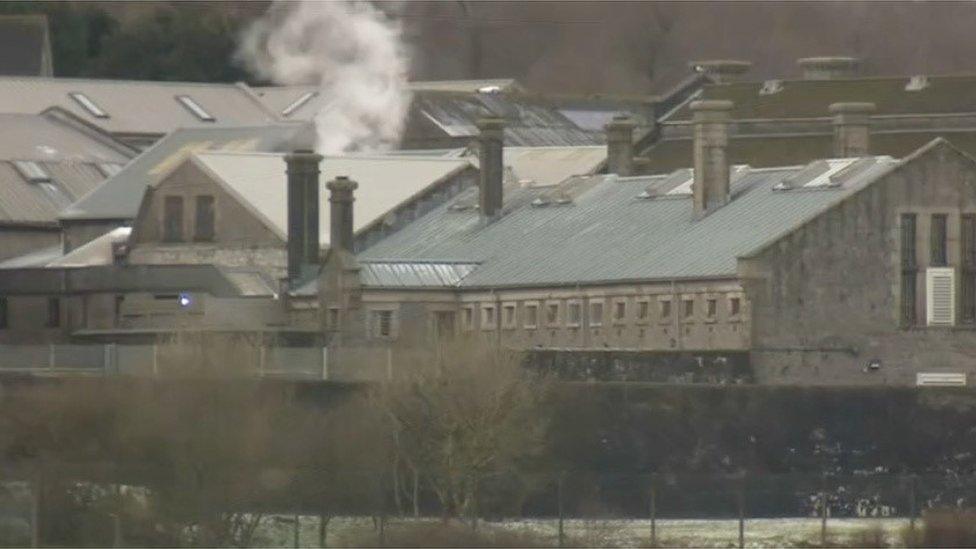Prison staff's 'health worries over radon'
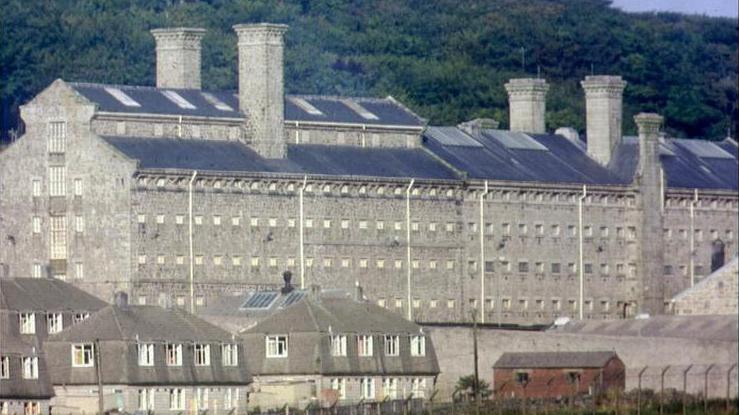
HMP Dartmoor is under investigation by the Health and Safety Executive (HSE)
- Published
Staff at a Devon prison at the centre of an investigation into high levels of radioactive radon gas are concerned about their health, according to their union.
Peak radon levels detected at HMP Dartmoor in 2020 and 2023 were 10 times the recommended workplace limit, according to the response to a Freedom of Information (FOI) request submitted by the BBC.
More than 400 prisoners have been moved from the Devon prison since December 2023.
A Prison Service spokesperson said: "Prisoners will be gradually returned to HMP Dartmoor following conversations with the Health and Safety Executive as we have ongoing mitigations in place to limit radon exposure."
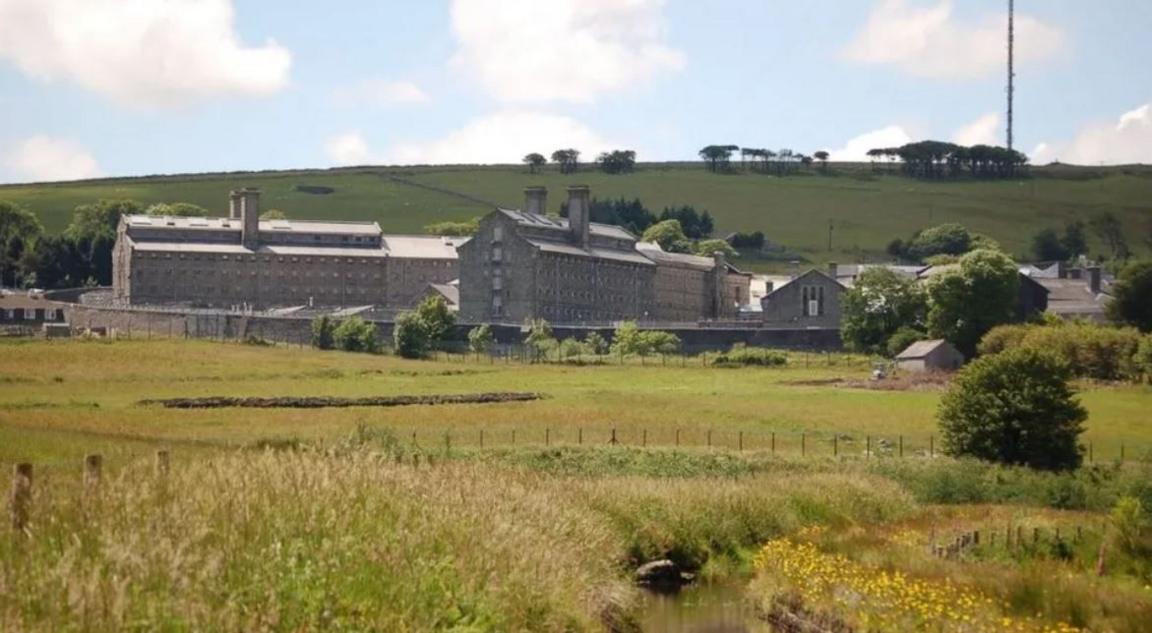
More than 300 prisoners are understood to have sought legal advice
They said: "We continue to engage closely with the Health and Safety Executive and we will regularly review the situation."
Radon is an odourless radioactive gas formed by decaying uranium found in rocks and soils.
It is recognised to be a leading cause of lung cancer in the UK.
The Health and Safety Executive (HSE) started its investigation in December, the same month in which the first inmates were moved from the prison.
More than 300 prisoners and former inmates are understood to have sought legal counsel over their potential exposure to radon.
Sarah Rigby, South West representative for the Prison Officers' Association (POA), said "several" of the 126 staff they represented at Dartmoor had approached the union.
"The vast majority of our members are concerned about the radon being at Dartmoor," she said.
Ms Rigby said: "They're obviously worried about any future health connotations that this might have, it's something they potentially won't know for 10, 20, 30 years."
'Protect themselves'
"They're watching prisoners be transferred out but they're still working there on a daily basis - you can understand why they are worried," she said.
"There's nothing they can do to protect themselves."
Ms Rigby said: "They feel that the prison and prison service aren't doing enough to address their concerns and that things aren't moving quickly enough."
The Ministry of Justice (MoJ) said it had kept staff and unions updated.
Ms Rigby said as of 14 June, 138 prisoners remained at HMP Dartmoor - less than a quarter of its 640-space capacity.
MoJ figures show there were 677 prisoners at Dartmoor in November 2023, reducing to 243 in May 2024, the most recent official figures available.
According to the MoJ, as of 21 June, there were 87,395 prisoners across the UK, against a useable capacity of 88,778.
Ms Rigby said there were enough spaces nationwide to last "about another three weeks".
"It’s no great secret that prisons are suffering with overcrowding and could do with spaces at Dartmoor but the reality is if the HSE says we can't use them, we can't use them."
Peak levels
Radon is measured in becquerels per cubic metre of air (bq/m3).
The average level in UK homes is 20 bq/m3, according to the UK Health Security Agency (UKHSA).
Agency guidance cites levels may be higher in parts of the country rich in granite, such as Dartmoor in Devon and across areas of Cornwall.
The Ionising Radiation Regulations 2017 require that action be taken when levels reach 300bq/m3., external However, the limit for "domestic settings" is 200bq/m3, the Radon Association said.
In 2020, the average annual radon level peaked at 2,988bq/m3 in one area of the prison, according to one of the measuring devices distributed throughout the building - the FOI response said.
It is understood readings in 2020 were taken in "non-accommodation areas".
Meanwhile, in 2023 "within A wing cellular accommodation" the highest recorded level, seasonally adjusted to calculate the annual average, was 3,123 bq m-3.
These were peak levels in certain areas, while readings across the prison varied widely.
In 2020, levels dropped as low as five bq m-3 in one area of the prison, according to one reading, while 9 bq m-3 was the lowest reading detected in one area by one recording device in 2023.
It is understood HMPS has been “decanting” prisoners whose cells registered a radon concentration of 154bq/m3.
The BBC asked the prison service how much public funding had so far been spent on measures to reduce radon levels, but it declined to share this figure.

Dr Maria Dugdale, chairman of the Radon Association, said the readings were worrying
Dr Maria Dugdale, chairman of the Radon Association, said: "It's worrying that such high levels have been detected but not surprising given the area.
"What really matters with radon is not just the level you measure, but also the amount of time spent there.
"If somebody has spent significant amount of time in this sort of concentration that could be a problem with respect to health.
"Once high levels of radon have been identified in a workplace, further monitoring should be undertaken whilst remedial options are being considered and implemented."
She added: "I think what's tricky is they have so many varying levels of radon it must be virtually impossible to figure out how much time people have spent in the different areas."
'Everyone at risk'
A former prisoner, who asked to remain anonymous, said he had received a letter detailing his estimated "exposure level", which was above the "annual dose limit" for the general public.
"It was there, putting everyone at risk, not just prisoners, staff as well.
"I just try not to think about it. I don't think it's anyone at the prison's fault. I think a lot of it came from above."
It is understood His Majesty’s Prison and Probation Service (HMPPS) had previously closed or restricted access to certain areas of the prison affected by radon, while also using fans and ventilation.
The installation of mechanical machines used to reduce radon levels has now been completed, it is understood.
Meanwhile, monitoring is understood to be ongoing, while the MoJ continues to take steps to maintain prison capacity.
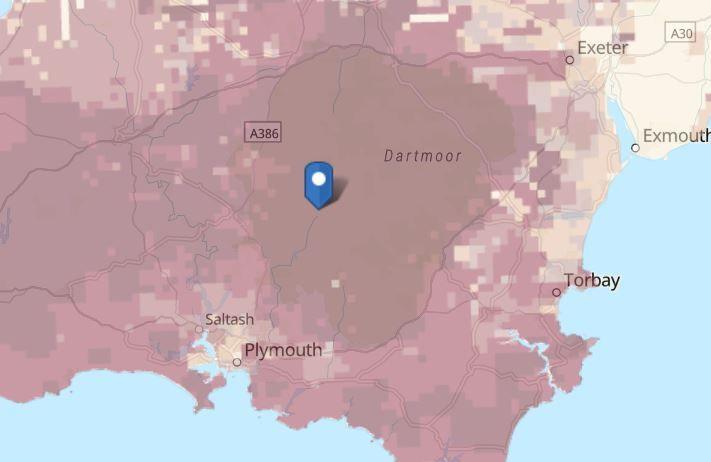
A map showing radon levels in England. The darker the colour, the greater the chance of a higher level
Mark Day, deputy director of the Prison Reform Trust, said Dartmoor was an example of an "old poorly located Victorian prison that should have been closed decades ago".
He said prison numbers were predicted to rise as high as 114,800 by March 2028: "Decommissioning whole wings of the prison, while necessary given the dangerous levels of radon detected, will simply add to the crisis of capacity which the prison system is currently experiencing."
The FOI response from HMPPS and MoJ said: "No prisoner or staff member has reported illness or adverse reaction to the radon exposure."
It said there were "no safety implications to staff or prisoners who remain on site".
It added: "For the last several years, we have been monitoring levels of radon in HMP Dartmoor and have already taken some steps to address initial results and protect prisoners and staff."
An HSE spokesperson said: “We have written to His Majesty’s Prison and Probation Service (HMPPS) informing them of legal requirements relating to radon exposures.
“The legal duty to keep prisoners and staff safe rests with HMPPS.
“However, our investigation is ongoing and we cannot comment further at this time.”
Towards the end of last year, a report from the Independent Monitoring Board said the Category C prison was overcrowded, understaffed, and under-resourced.
It added the prison failed to provide a humane, fair, or safe environment for the prisoners.
Follow BBC Devon on X (formerly Twitter), external, Facebook, external and Instagram, external. Send your story ideas to spotlight@bbc.co.uk, external.
Related topics
- Published27 February 2024
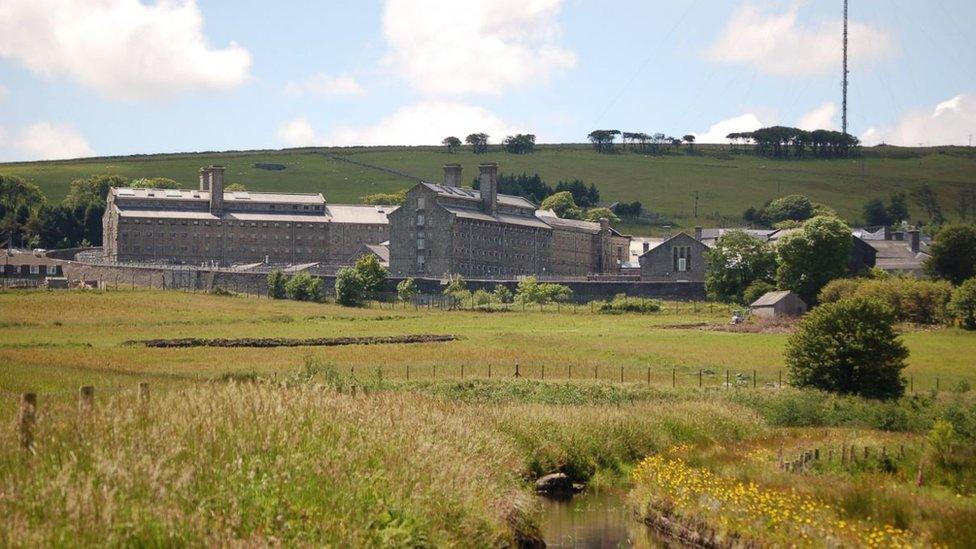
- Published5 April 2024
